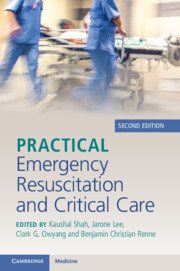Book contents
- Practical Emergency Resuscitation and Critical Care
- Practical Emergency Resuscitation and Critical Care
- Copyright page
- Contents
- Contributors
- Preface
- Section 1 General Critical Care
- Section 2 Infectious Disease Emergencies
- Section 3 Neurological Emergencies
- Section 4 Cardiovascular Emergencies
- Section 5 Respiratory Emergencies
- Section 6 Gastrointestinal Emergencies
- Section 7 Renal Emergencies
- Section 8 Hematology–Oncology Emergencies
- Section 9 Endocrine Emergencies
- 40 Diabetic Ketoacidosis and Hyperglycemic Hyperosmolar State
- 41 Thyroid Storm
- 42 Adrenal Crisis
- Section 10 Environmental Emergencies
- Section 11 Trauma
- Section 12 End of Life
- Index
- References
42 - Adrenal Crisis
from Section 9 - Endocrine Emergencies
Published online by Cambridge University Press: 02 November 2023
- Practical Emergency Resuscitation and Critical Care
- Practical Emergency Resuscitation and Critical Care
- Copyright page
- Contents
- Contributors
- Preface
- Section 1 General Critical Care
- Section 2 Infectious Disease Emergencies
- Section 3 Neurological Emergencies
- Section 4 Cardiovascular Emergencies
- Section 5 Respiratory Emergencies
- Section 6 Gastrointestinal Emergencies
- Section 7 Renal Emergencies
- Section 8 Hematology–Oncology Emergencies
- Section 9 Endocrine Emergencies
- 40 Diabetic Ketoacidosis and Hyperglycemic Hyperosmolar State
- 41 Thyroid Storm
- 42 Adrenal Crisis
- Section 10 Environmental Emergencies
- Section 11 Trauma
- Section 12 End of Life
- Index
- References
Summary
Adrenal insufficiency can be either primary, resulting from destruction of the adrenal gland, or secondary, resulting from a deficiency of ACTH (adrenocorticotropic hormone, corticotropin).
Adrenal crisis is either the acute development of severe adrenal insufficiency or a rapid deterioration from baseline chronic adrenal insufficiency (which is often insidious) brought on by a stressor.
The adrenal gland (made up of cortex and medulla) produces three categories of steroids: glucocorticoids (cortisol), mineralocorticoids (aldosterone) and gonadocorticoids (sex hormones). Aldosterone levels change in response to volume status and sodium intake. Aldosterone maintains sodium and potassium concentration and regulates water balance.
- Type
- Chapter
- Information
- Practical Emergency Resuscitation and Critical Care , pp. 433 - 442Publisher: Cambridge University PressPrint publication year: 2023



